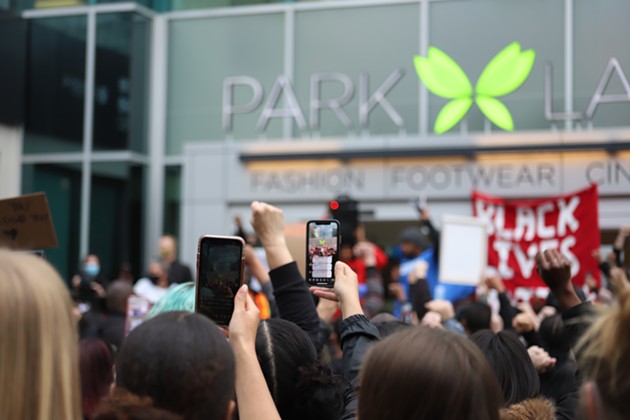The focus of the media has shifted in the past week, from the coronavirus to an international protest movement in support of Black lives. “With pandemic and tragedy and grief, it’s been up and down, it’s been a rollercoaster,” says Bradley Daye, owner of Placemaking 4G, a Halifax-based recruiting company.
Daye, who is African Nova Scotian, says the support has been encouraging. But he’s worried it will fade. “You’re seeing now a lot of people looking to mobilize on this, go out and protest,” he tells The Coast. “Those things are important, but how can we make sure there’s lasting change from this and there’s lasting impact?”
The entrepreneur says some allies have begun realizing their support might only be surface-level. For white people, it’s easy to put racism out of their minds when it’s not on their TV screens and in their newsfeed.
“It’s something we’ve been dealing with for 400 years. It’s never been a privilege for us to have it be something that’s topical and occasional,” he says. “It’s something that’s always top of mind.”
Daye is one of 13 members of ACCE Nova Scotia—an organization that seeks to build the Arts, Culture, Community and Economics of the African Nova Scotian community. “Every month we meet, we put in our own personal money. We self-fund the projects that we want to do.”
Traditionally, Daye says, people of colour have been left out of industries like arts and business. “When you look at entertainment in Halifax, in Nova Scotia, you’d be hard-pressed to find any entertainment establishments owned or that are for people of colour.”
That’s why ACCE is trying to support business owners of colour. The group maintains a pot of money to help out African Nova Scotian enterprises and organizations. “Whether that be support Black-owned businesses, whether that be events and performances and support local artists, whether that be education,” Daye says. “It’s kind of a wide range of various things.”
In the coming months, coinciding with the launch of its website, ACCE plans to sell boxes full of items created by people of African Nova Scotian descent, or who are part of the wider Black community.
“We’re going to identify different Black-owned vendors that will put up different products, whether they be a meal or whether they be an article of clothing of a fragrance,” says Daye. He hopes the boxes will get people more interested in including Black-owned businesses in their daily routine. “That alone is creating a habit of people purchasing from these vendors, and making an introduction from the consumer to the business.”
Part of those profits will go back to the vendors, while a portion will go into two funds: the African Nova Scotian Compassion Fund for socio-economic projects, and the African Nova Scotians for Business and Incubation Fund for business initiatives.
“The whole point here is to just grow the Black economy as a whole so that our dollar is able to stay within our community longer and we’re able to build up each other, which right now it’s very difficult to do,” Daye says.
When money goes back into the Black community, he says it leads to hiring other people of colour and putting money where they see fit. “It doesn’t come with government strings attached, it doesn’t come with other political mandates and political agendas attached.”
But it shouldn’t all be on independent organizations. Daye wants the government to step up and do more as well.
“Whether it be tax breaks, or private investment from venture capitalists into Black businesses, especially Black women-owned businesses,” he says, noting that people of colour are often left out of the most profitable industries in the province. “When you look at our major industry here in Nova Scotia—tourism, we’re left out of that market. Breweries, and entertainment, those are huge markets here, and it’s a place where we need to create more incentive.”
Daye says the rally held on June 2 was “historic” for Nova Scotia and a great show of support from outside the Black community, but he hopes those people keep reaching out in the long run.
“A lot of our allies and friends are reaching out and saying, you know, how can I support, how can I help? Which is nice now,” he says. “I just hope that this momentum doesn’t fizzle out until the next tragedy, and that it continues to stay top of mind and turns into more of a behavioural shift.”
To find other Black-owned businesses and organizations in Nova Scotia, check out the following directories:
Growing the Black economy with no strings attached
ACCE Nova Scotia is looking for allies who want to make change that lasts longer than the media’s attention span.
[
{
"name": "Air - Inline Content - Upper",
"component": "26908817",
"insertPoint": "1/4",
"requiredCountToDisplay": "8"
},{
"name": "Air - Inline Content - Middle",
"component": "26908818",
"insertPoint": "1/2",
"requiredCountToDisplay": "8"
},{
"name": "Air - Inline Content - Lower",
"component": "26908819",
"insertPoint": "100",
"requiredCountToDisplay": "1"
}
]


